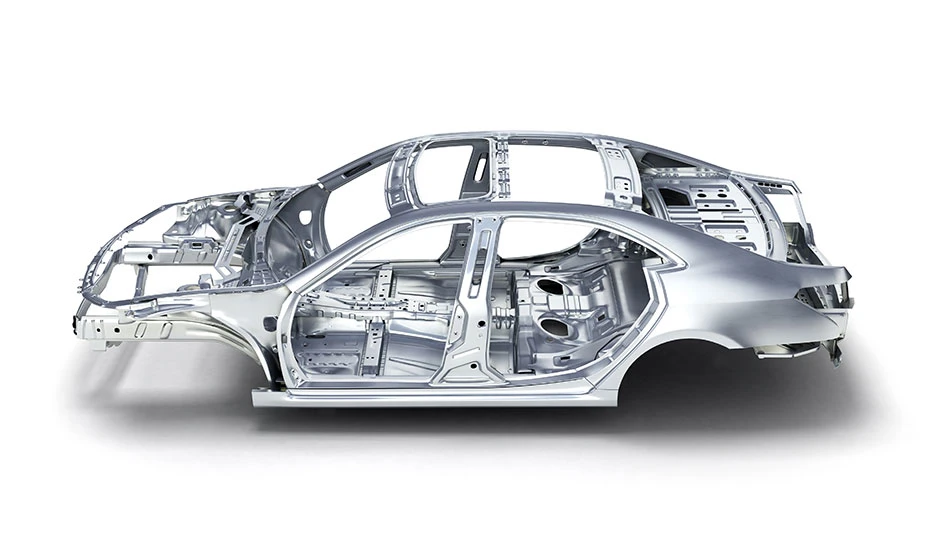
Photo courtesy of Alumobility
Alumobility, a Zurich-based global association committed to advancing the adoption of aluminum by automakers, has completed a research project that analyzed the conversion of steel parts on a mixed material production body-in-white (BIW) to a full aluminum BIW. According to Alumobility, the BIW is the car body’s main structure at a stage in manufacturing in which it has been joined together before painting and before the motor, chassis, subassemblies or interior and exterior trim have been integrated into the structure.
Alumobility reports that converting steel parts on a mixed material production BIW to a full aluminum BIW results in 40 percent weight savings for the sum of the converted parts while also maintaining or improving specific BIW attributes for safety, noise, vibration and harshness.
According to the research, aluminum-intensive BIW offers complexity reduction opportunities and reduces the total number of parts and joints while also lowering gauge and grade combinations when compared with steel-intensive mixed material BIW.
Alumobility completed this project in conjunction with a leading global automaker, using one of the automaker’s latest mixed material production battery electric vehicles (BEV) BIW structures.
The association says it plans to present these findings at the upcoming Automotive Circle Car Body Xperience conference April 26 in Rochester, Michigan. Alumobility will discuss how different original equipment manufacturers (OEMs) and their suppliers are addressing vehicle weight-related challenges; solutions that have been developed and implemented to date; strategies for cost, time and resource efficiency; and how car bodies can be engineered to provide the best solutions.
“This conference is an ideal venue to present our latest project’s findings,” says Mark White, technical director of Alumobility, who is presenting findings to an audience of automotive engineers, designers and manufacturers at the conference. “This is the audience we need to understand that shifting from steel to aluminum-intensive BIW delivers 40 percent weight savings for the same attribute performance while reducing the total number of parts and joints. Our goal is to inform the automotive industry on the benefits of aluminum, and this conference helps us engage with [original equipment manufacturers], which is key to achieving our mission.”
Latest from Recycling Today
- BMW Group, Encory launch 'direct recycling’ of batteries
- Loom Carbon, RTI International partner to scale textile recycling technology
- Goodwill Industries of West Michigan, American Glass Mosaics partner to divert glass from landfill
- CARI forms federal advocacy partnership
- Monthly packaging papers shipments down in November
- STEEL Act aims to enhance trade enforcement to prevent dumping of steel in the US
- San Francisco schools introduce compostable lunch trays
- Aduro graduates from Shell GameChanger program





